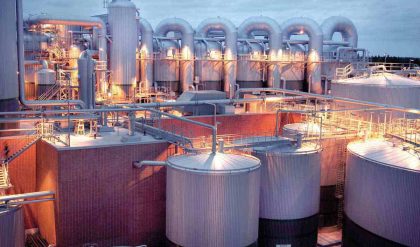The enthalpy change of neutralisation is defined as the enthalpy change accompanied by the complete neutralisation of one gram – equivalent amount of a strong acid by a gram-equivalent amount of strong base under fully ionised state in dilute conditions. It is found that the enthalpy of neutralisation of a strong acid and a strong base is a constant value equal to -57.32 kJ. This value is independent of the nature of the strong acid and strong base. Strong acids and strong bases exist in the fully ionised form in aqueous solutions as below:
H3O+ + Cl– + Na+ + OH– — — > Na+ + Cl– + 2H2O (or)
H3O+(aq) + OH–(aq) — — > 2H2O(l) ∆neuHo = -57.32 KJ.
The H+ ions produced in water by the acid molecules exist as H3O+. During the neutralisation reaction, water and salt (existing as ions) are produced in solution. Thus, enthalpy change of neutralisation is essentially due to enthalpy change per mole of water formed from H3O+ and OH– ions. Therefore, irrespective of the chemical nature, the enthalpy of neutralisation of strong acid by strong base is a constant value. At infinite dilutions, complete ionisation of acids and bases are ensured and also the inter ionic interactions exist in the lowest extents.
In case of neutralisation of a weak acid like acetic acid (CH3COOH) by a strong base (NaOH) or neutralisation of weak base (NH4OH) by a strong acid, two steps are involved. The first step is the ionisation of weak acid or weak base since these molecules are only partially ionised. The second step being the neutralisation step of H3O+ and OH– ions. Since ionisation of weak acids and weak bases in water are endothermic and some energy will be used up in dissociating weak acid and weak base molecules.
Thus, acetic acid with NaOH and ammonium hydroxide with HCl neutralisation reactions can be written as,
CH3COOHaq + H2O2 — > CH3COO–aq + H3O+aq
Na+aq + H3O+aq + OH–aq — > 2H2O(l) + Na+aq
and
NH4OH — > NH4+ + OH–
H3O+ + Cl– + OH– — > 2H2O + Cl–.
Enthalpy of neutralisation of a weak acid or a weak base is equal to -57.32 kJ + enthalpy of ionisation of weak acid (or) base. Since enthalpy of ionisation of weak acid or base is endothermic it is a positive value, hence enthalpy of neutralisation of a weak acid or base will be lower than the neutralisation of strong acid and strong base.


